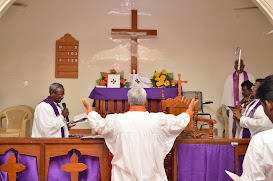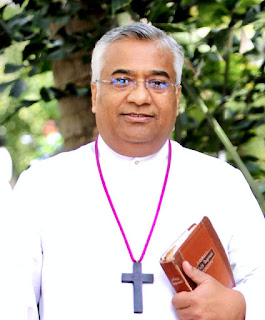Rt. Rev. Timothy Ravinder, Bishop in Coimbatore
CAUTIOUS OPTIMISM, COST-CONSCIOUSNESS & CORONA
20th June 2020
A brief meditation on 2 Samuel 23: 13-17 (ESV)
David became thirsty
Then he remembers that he is in the area of the
well in his native city, Bethlehem. To satisfy his NEED, David could not himself
go to the well to drink water: He was in a war zone. Three soldiers volunteered
to go and fetch water from the well.
David is PRICE-CONSCIOUS...
It did not cost anything to him. Perhaps the three
soldiers had to postpone another mission in order to fulfill this one. David
certainly had to calculate the danger. The action could be risky. But there was
a need to be met. Abandoned mission became the “costs” of production and
supply.
David is POWER-CONSCIOUS...
The soldiers breakthrough the enemy lines, get the
water and bring it to David. But now all logic is set aside. The risk taken by
the soldiers was in vain and the men are rewarded with nothing but ingratitude.
David did not want to drink the water. He suddenly becomes conscious of
something that he did not think of before. That is the LIBERATING TENSION of
this story. He now realises that he had ordered for a very expensive product.
The process of its production could have cost the lives of the producers. David
never thought about the value of the price which the others have to pay. He had
not calculated the risk of the worker.
David REPENTS...
At this moment David turns to the Lord in
repentance. He does not offer excuses to the soldiers, whose lives he had
endangered in an attempt to satisfy his own personal need. He turns to the
Lord. He pours the costly water out:
"Far be it from me, O LORD, that I should do this. Shall I drink
the blood of the men who went at the risk of their lives?" Therefore he
would not drink it. (V 17)
David
now realises his IRRESPONSIBLE ATTITUDE. By drinking the water he would have been drinking the blood of the men
themselves. David pours the water out to the Lord as a sign of regret and
repentance.
CHOICE AND CONSEQUENCE...
Biblical rationality involves in the calculation of
costs before the eyes of God where we see the real components of cost: risks
involved and damage inflicted on the individuals religious integrity. It takes
into account the current situation in the employment of labor and the working
conditions under which the product takes form.
If the cost endangers the welfare of another then
we must renounce consuming. It is possible our economic dealing should lead us
towards the establishment of an economic system that allows for the fullness of
the life of the other. AMEN



Comments
Post a Comment